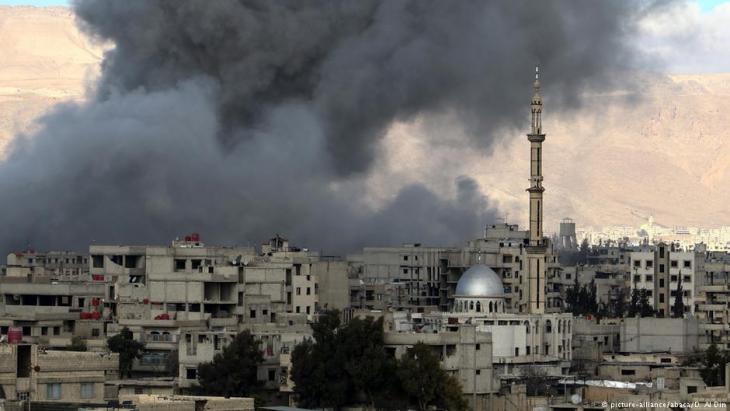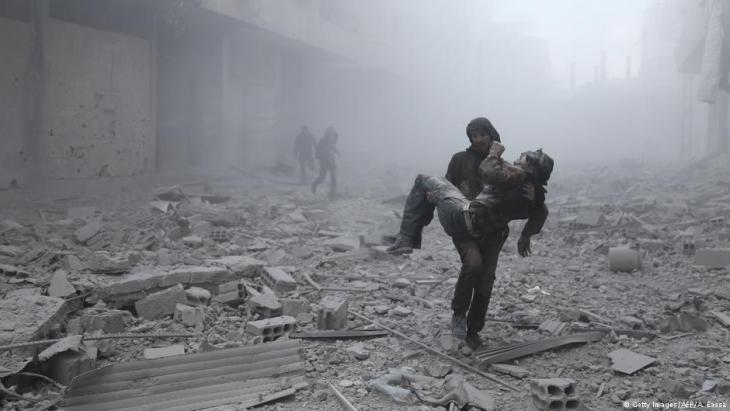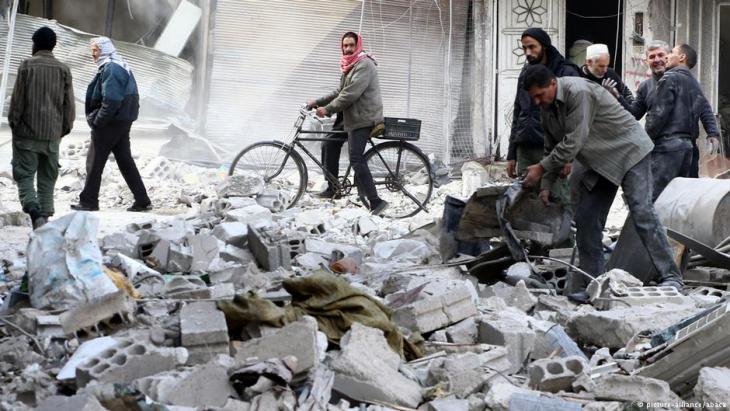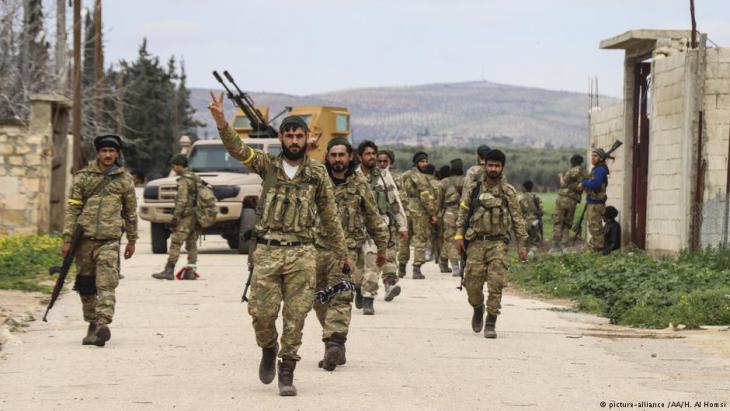Boundless cynicism

As one of the last rebel strongholds – right on the doorstep of Damascus – Eastern Ghouta has long been a thorn in the eyes of the Syrian army. Is Assad's strategy of capturing Eastern Ghouta and displacing its inhabitants paying off?
Kristin Helberg: What's happening in Eastern Ghouta is something we've seen in other locations in recent years. The Syrian regime is trying to recapture by military means all those areas controlled by the opposition – the original centres of the peaceful rebellion, which were subsequently captured by various rebel groups.
Today, the de-escalation zones should actually be called escalation zones because President Assad wants to bring them all back under his control. The methods are always the same: areas are sealed off; people are starved out and subjected to incessant bombing, as a way of depriving them of their livelihoods and forcing them to surrender. It's about subjugating people or driving them away. It's not a battle against terrorists, but the collective punishment of civilians who rebelled against Assad's rule, or who did nothing to counter the rebels in their home towns.
Turkey's actually supposed to be protecting the de-escalation zone around the rebel stronghold of Idlib, but it appears to be giving the Syrian regime a free hand – so that it can attack the Kurds in Afrin.

Helberg: All guarantors who should actually be enforcing de-escalation zones – namely Russia, Iran and Turkey – are failing in this role, because at the same time they are intervention powers, pursuing their own military interests in Syria.
In the case of Idlib in northwestern Syria – in the largest area held by Islamist rebels and jihadists – Turkey is actually responsible for de-escalation. But Turkey has other priorities: it wants to destroy or at least weaken the YPG, the People's Protection Units, militarily. To achieve this, President Erdogan is willing to make concessions elsewhere, for example, by leaving the province of Idlib to the Assad regime with its supporters Russia and Iran.
A ground offensive is already underway there. More than 200,000 people have been displaced, some for the second or third time. This is because many Syrians were "evacuated" – or displaced – to Idlib from other rebel-held areas – the province serves as a catchment area for all those who have in some way opposed the regime. In the end, Idlib will suffer the same fate as Homs, east Aleppo, Eastern Ghouta and other regions. It's all going according to plan. Assad is politically cleansing the nation, supporters are being allowed to stay, opponents must make themselves scarce, he himself talks of a "more homogenous, healthier society".
If all this could have been predicted, why then did no power do something to rush to the aid of the people? Or was this never about supporting regime change in Syria?

Helberg: Assad opponents – activists, rebels, members of the opposition – never had the support they needed to topple the regime. That's why the civilian resistance first and foremost feels abandoned by the West. The real problem in Syria is that everyone's intervening but no-one is helping civilians. No military power present in Syria is concerned with protecting civilians; they're all just pursuing their own interests. That's the real failure of the international community.
The civilian resistance was crushed and the armed struggle of the Syrian opposition was destined to fail as soon as the Russians became involved. What impact has this had on the course of the war in Syria?
Helberg: On the regime opponents' side, many are now battling for their own survival. Most of the fighters are Syrians who have been radicalised and Islamised over the years. In Eastern Ghouta too. There's only a small presence of foreign jihadists there, most come from the local area. These Islamist groups were founded by Salafists released by Assad from Seidnaya prison in 2011 with the aim of allowing the revolution to be hijacked by extremists. It worked, and now in Eastern Ghouta, it's the activists that suffer most under the Islamists' rule. They know they probably won't be able to hold the territory for much longer. But their only option is a withdrawal to Idlib, where they'll continue to face bombardment.
The most tragic thing is that the armed resistance in Syria has become an entity to be manipulated and exploited by foreign actors in the pursuit of their own ends. Just look at the Free Syrian Army (FSA), for example, how low it has fallen. In late 2011, demonstrators celebrated the FSA rebels as protectors and freedom fighters; six years later, in February 2018, members of the FSA mutilated the corpse of a female Kurdish fighter in Afrin. Elements of the FSA now serve as Turkish mercenaries.

So why did the FSA never really become a liberation army?
Helberg: The armed resistance was split right from the outset, because each and every local group had to finance and arm itself. Those who could drum up the most cash became leaders – not those with the most military experience. All attempts to establish and alternative army with a central command structure and hierarchy failed as the West dithered. The Americans and Europeans promised much, but delivered very little. For this reason, hundreds of groups financed themselves locally and regionally. Their donors were in the Gulf, regional powers Saudi Arabia, Qatar and Turkey also paid hefty contributions – preferably for brigades that conducted themselves like Islamists.
So that means these powers contributed to an Islamisation of the war?
Helberg: Exactly. An Islamist demeanour brought the rebels more money and weapons. That's why after 2012, many brigades changed their names. The main problem was that the FSA wasn't consistently centrally financed, which is why their commanders had nothing to offer the fighters. The Islamists paid a higher wage, had better arms, more food, were organised effectively, they were disciplined and more successful in the fight against the regime.
Interview conducted by Diana Hodali
© Deutsche Welle 2018
Translated from the German by Nina Coon
Political analyst and journalist Kristin Helberg lived in Damascus from 2001 to 2008, where for a long time she was the only officially accredited western correspondent. From Syria she reported on the Arabic and Islamic world for European media. These days she works as an author and Middle East expert in Berlin.
